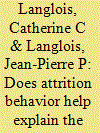| Srl | Item |
| 1 |
ID:
092341


|
|
|
|
|
| Publication |
2009.
|
| Summary/Abstract |
Does attrition behavior, defined as waiting for the other side to give in despite the costs of delay, help explain the duration of interstate wars? To answer this question we develop a war and bargaining model that integrates a dynamic progression of the war and allows the rivals to make offers at any time of their choosing while they fight. The model predicts that, in equilibrium, states choose to fight without making significant offers in the hope that the other side will give in to outstanding demands. The model also predicts that each side's flow cost of war increases with the probability that the other side gives in to its demands. This is the testable consequence of attrition behavior. Our statistical analysis suggests that both challenger and defender include attrition behavior in their conduct of warfare, and that this behavioral element significantly affects the duration of interstate wars.
|
|
|
|
|
|
|
|
|
|
|
|
|
|
|
|
| 2 |
ID:
065007


|
|
|
| 3 |
ID:
151399


|
|
|
|
|
| Summary/Abstract |
President Obama’s call for change in the conduct of US foreign policy shifts emphasis from direct interventions to cooperative partnerships. With a
billion pledge as support for their development, the issue of effectiveness and design is brought to the fore. If terror organizations cannot be eradicated, can a donor state successfully delegate the deterrence or at least the containment of a violent non-state actor to the host country from which it operates? We identify, assess for impact, and value rational delegated deterrence arrangements, in which the US subsidizes a host, and the host, with agreed upon vigor, inhibits the activity of the violent non-state actor operating within its borders. We account for the US’ imperfect monitoring of host and non-state actor activity and identify agreements that can successfully deter the targeted organizations. We also find that mutually agreeable weak cooperation between donor and host can endure despite the survival of the violent non-state actor on host territory.
|
|
|
|
|
|
|
|
|
|
|
|
|
|
|
|